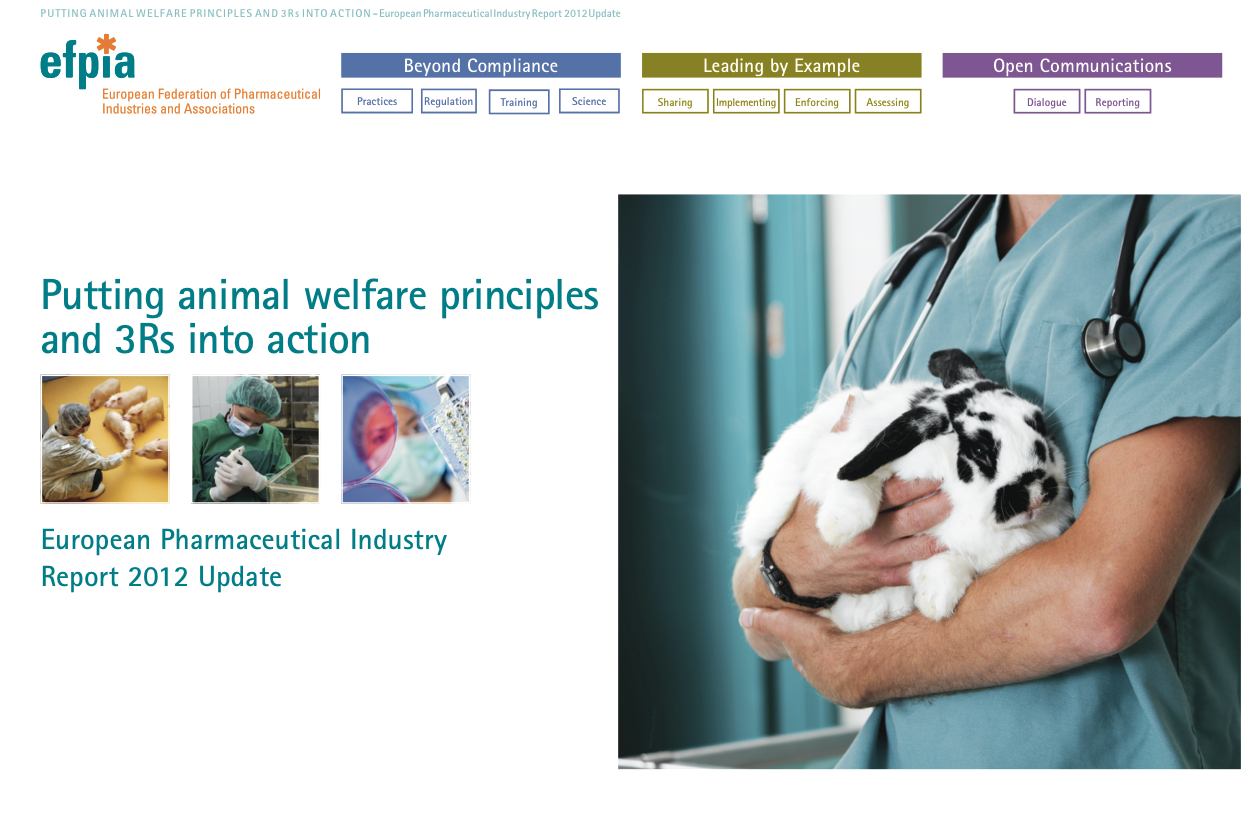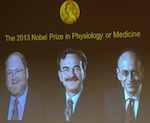- Home
- Editorial Team

Animal testing? Yes, but…
Camille De Rede October 20th, 2014 No Comments
 (photo: Thomas Cueni)
(photo: Thomas Cueni)
The Swiss are somewhat sceptical about animal testing for research purposes. This unsurprising stance was most recently shown in a representative survey of 1000 Swiss voters conducted by gfs.bern on behalf of Interpharma. However, when asked whether animal testing should be banned even where universities and pharmaceutical firms have no other means of advancing research, only 34 per cent of respondents said it should be banned whereas 58 per cent would accept animal testing in such circumstances. There was greater consensus - 70 per cent – regarding approving animal testing for general medical research and research into drugs for the treatment of diseases. There has been barely any change to this critical but approving stance since the last survey in 2009. This is unsurprising considering much medical progress has its roots in animal testing – like the knowledge of the three neuroscientists awarded the Nobel prize in Medicine last week.
It has a lot to do with the conviction of a significant majority of those surveyed – 55 per cent – that Switzerland has a strict animal welfare law. Only 22 per cent of respondents consider animal welfare in Switzerland to be too lax. The remainder do not know or are undecided. They are very capable of deciding however, when it comes to where animal testing should take place. 91 per cent of those surveyed consider it preferable to allow animal testing under strict conditions in Switzerland than for it to be outsourced abroad to where regulations are less strict.
This critical but favourable opinion of animal testing is also the result of efforts by animal welfare organisations, lawmakers and researchers in Switzerland. Instead of the sometimes radical but unsuccessful opposition to animal testing in the 80s and 90s, there is now dialogue. Undeniable progress has been made. The laboratory animal welfare charter, which Interpharma firms adopted in 2010, is not just attracting interest in Switzerland. The industry is recognising that the legitimate interests of animal welfare campaigners should not simply be pushed aside. However, animal welfare organisations and the research-driven pharmaceutical industry continue to evaluate the necessity of animal testing differently. They agree that animal testing should only be carried out when there is no alternative and authorisation has given following careful weighing of the suffering and distress caused to the animal against the expected gain in knowledge.
As such, both sides – the industry and animal welfare organisations – strongly support a national research programme that should increasingly develop alternatives to animal testing following the principles of the 3Rs. These aim to reduce animal testing, replace it as much as possible with alternatives such as computer simulations, testing cells and tissues and refine methods to minimise the stress caused to the animals. This is widely supported in Switzerland: 83 per cent of respondents were in favour of a research programme exploring alternative methods to animal testing. This wish must be taken seriously, particularly given the importance attributed to animal welfare in Switzerland.
About Thomas Cueni
Thomas B. Cueni is Secretary General of Interpharma, the association of the Swiss pharmaceutical research companies. He is a member of the Board and Council of the European Federation of the Pharmaceutical Industries’ Associations (EFPIA) and of the International Federation of Pharmaceutical Manufacturers Associations (IFPMA). Prior to his appointment with Interpharma, Mr. Cueni had a career as an economic and political journalist for two leading Swiss newspapers and spent four years as a London correspondent. After that he joined the Swiss Foreign Service as a career diplomat with postings in Vienna (UNIDO, UN, IAEA) and in Paris where he was a member of the Swiss Delegation to the OECD. Mr. Cueni has a degree in economics (University of Basle) and a Master of Science from the London School of Economics.

Report: Putting animal welfare principles and 3Rs into action – 2012 Update
Camille De Rede January 22nd, 2014 No Comments
 Putting animal welfare principles and 3Rs into action
Putting animal welfare principles and 3Rs into action
European Pharmaceutical Industry Report 2012 Update
Beyond Compliance:
- How do we ensure that animal welfare standards and practices are put into action throughout the sector both in our industry and among the laboratory and research community more broadly?
- How do we make sure that global regulations reflect 3Rs strategies?
- What internal and external industry initiatives facilitate the implementation of training programmes on animal welfare and care?
- How do scientific advances help progressing 3Rs and Welfare? *New
Leading by Example:
- How do we share and encourage good practices based on 3R principles across the pharmaceutical industry?
- How do we stimulate putting into practice global animal welfare standards?
- What is being done to rapidly implement and enforce across Europe the revised European Directive 2010/63/EU on the protection of animals used for scientific purposes?
- Are companies independently assessed on how animal welfare standards are applied?
Committing to Open Communication:
- How do we contribute to an open and constructive dialogue on animal welfare?
- How is industry communicating the progress made with animal welfare activities, specifically the 3Rs?

Getting back into the swing of things with Nobel Prize News
Camille De Rede October 15th, 2013 No Comments
 It’s been some time since we’ve written but we’ll now be getting back to regular updates. Last week’s big Nobel Prize announcement for medicine/physiology seemed the perfect opportunity to kick things off again. The award went to three scientists who discovered how cells in the body transport material – research with major potential implications for progress in areas like diabetes and brain disorders
It’s been some time since we’ve written but we’ll now be getting back to regular updates. Last week’s big Nobel Prize announcement for medicine/physiology seemed the perfect opportunity to kick things off again. The award went to three scientists who discovered how cells in the body transport material – research with major potential implications for progress in areas like diabetes and brain disorders
So why is the Nobel Prize inspiring a blog, here? As with most Nobel Prize research, animal studies were integral to the researchers’ success. In this case, yeast, cows and genetically modified mice were involved in the research process. Looking back, nearly all Nobel Prizes in Physiology or Medicine have required some form of animal research. According to Americans for Medical Progress, in the past 34 years, all awards but one have been dependent on animal research.
The impact of this year’s prize-winning discovery could be big news for patients suffering from diabetes or brain disorders. The three researchers discovered that vesicles – membranous structures that store and transport cellular products – transport these materials to a precise target, similar to a fleet of ships. This is crucial to many processes – from the release of hormones in the body to brain communication. Defective vesicle transport systems are associated with diabetes and brain disorders – and knowing more about them could help us improve treatment options in these areas.
So congratulations to James Rothman, Randy Schekman and Thomas Sudhof for their Nobel Prize win, and for bringing research a step further.
What are your thoughts on the big Nobel Prize news? Let us know in the comments section below

Could animal-free research deliver new medicines more efficiently?
January 24th, 2012 No Comments
 Non-animal research methods could make drug development faster and cheaper, according to an award-winning researcher.
Non-animal research methods could make drug development faster and cheaper, according to an award-winning researcher.
Professor Claus-Michael Lehr, a drug development scientist at the Helmholtz-Institute for Pharmaceutical Research Saarland (HIPS), believes new methods using cell culture instead of rats and mice will help deliver medicines more efficiently.